Ethics: Environmental and Working Conditions Issues Faced by McDonald's
VerifiedAdded on 2022/11/15
|10
|2635
|225
AI Summary
This document discusses the ethical issues faced by McDonald's, including environmental and working conditions issues. It also provides ethical frameworks for addressing these issues. The document includes a reflection on future workplace behavior, professional ethics, senior management behavior, corporate governance, and organizational culture.
Contribute Materials
Your contribution can guide someone’s learning journey. Share your
documents today.

Ethics
Secure Best Marks with AI Grader
Need help grading? Try our AI Grader for instant feedback on your assignments.
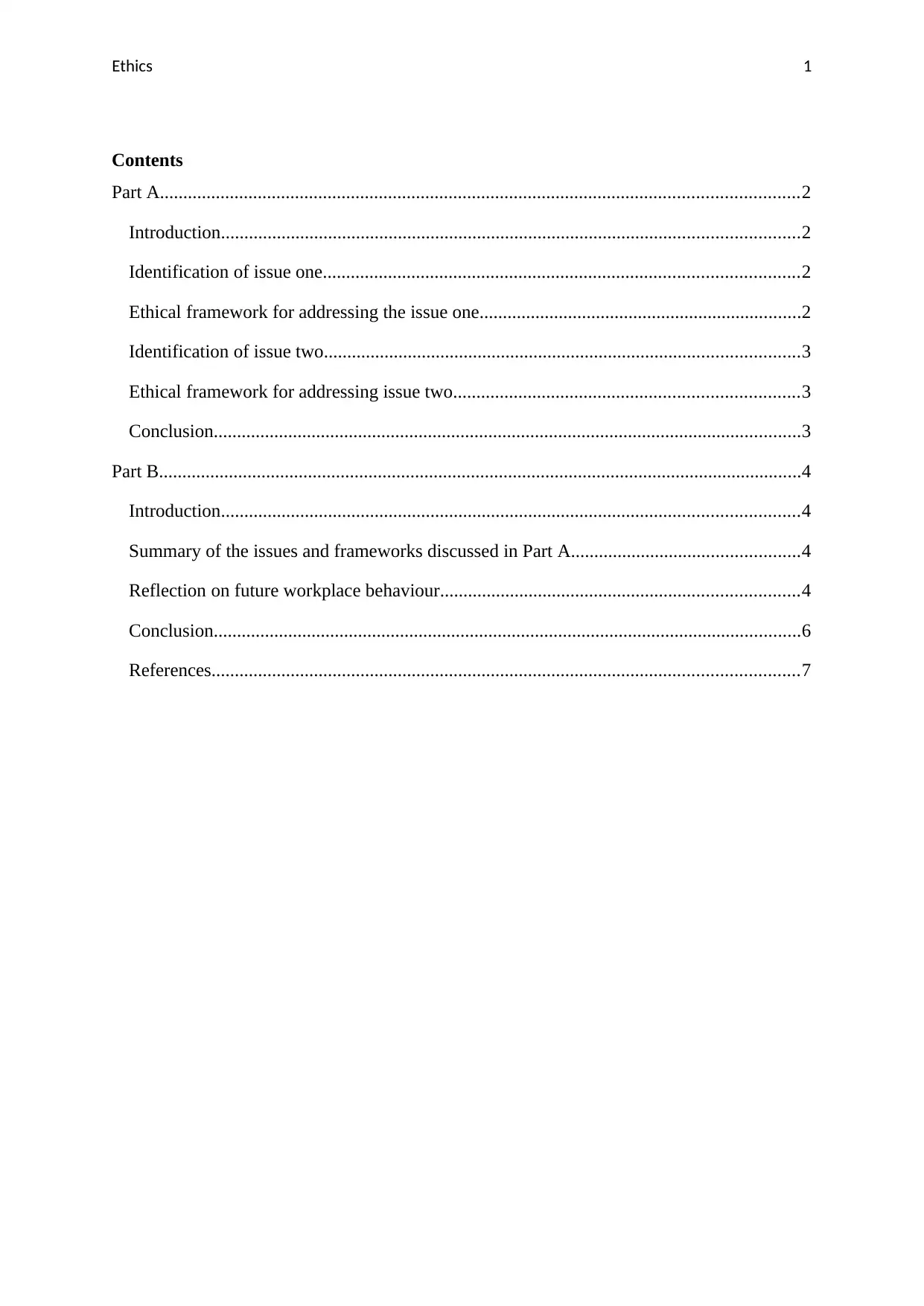
Ethics 1
Contents
Part A.........................................................................................................................................2
Introduction............................................................................................................................2
Identification of issue one......................................................................................................2
Ethical framework for addressing the issue one.....................................................................2
Identification of issue two......................................................................................................3
Ethical framework for addressing issue two..........................................................................3
Conclusion..............................................................................................................................3
Part B..........................................................................................................................................4
Introduction............................................................................................................................4
Summary of the issues and frameworks discussed in Part A.................................................4
Reflection on future workplace behaviour.............................................................................4
Conclusion..............................................................................................................................6
References..............................................................................................................................7
Contents
Part A.........................................................................................................................................2
Introduction............................................................................................................................2
Identification of issue one......................................................................................................2
Ethical framework for addressing the issue one.....................................................................2
Identification of issue two......................................................................................................3
Ethical framework for addressing issue two..........................................................................3
Conclusion..............................................................................................................................3
Part B..........................................................................................................................................4
Introduction............................................................................................................................4
Summary of the issues and frameworks discussed in Part A.................................................4
Reflection on future workplace behaviour.............................................................................4
Conclusion..............................................................................................................................6
References..............................................................................................................................7
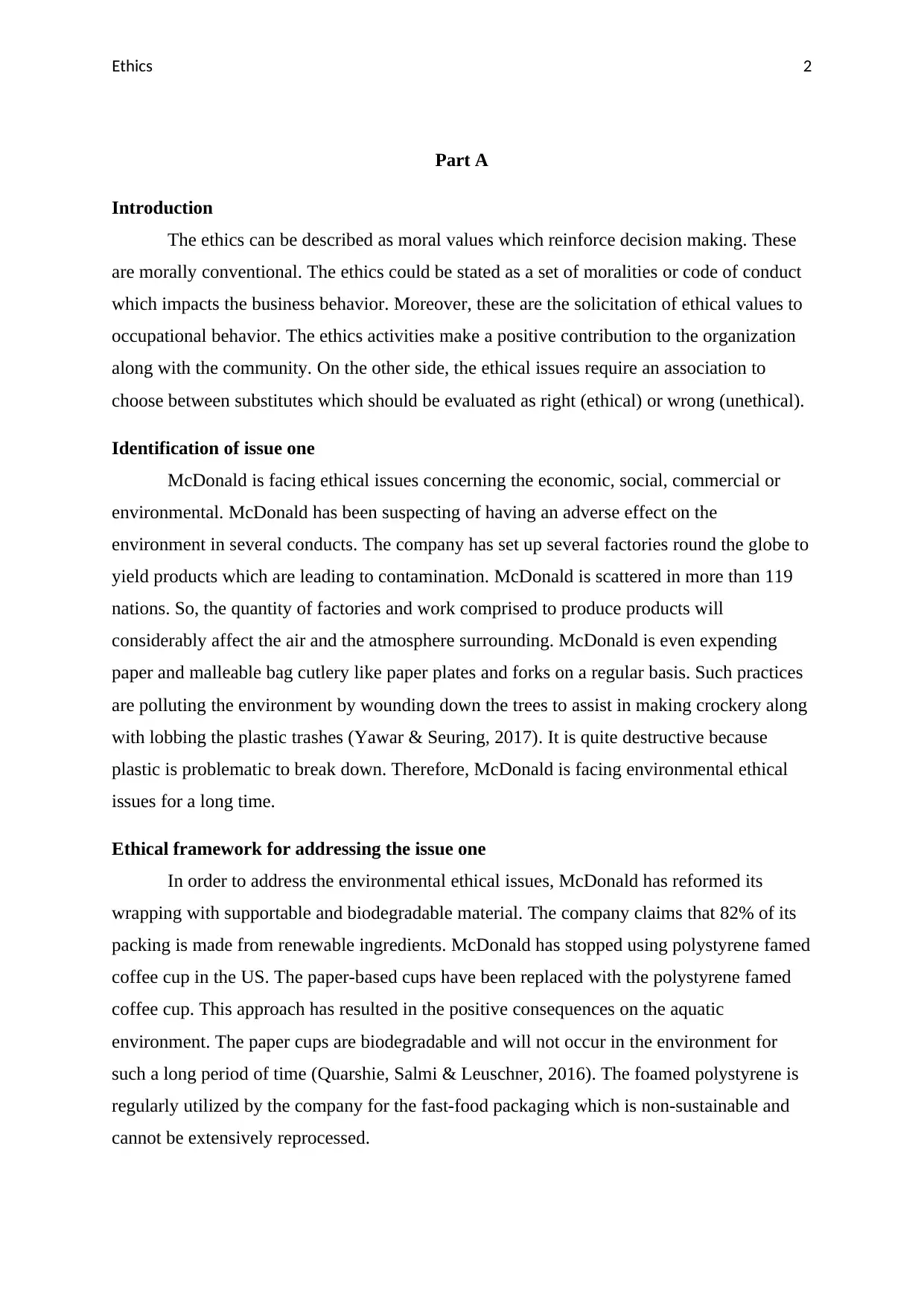
Ethics 2
Part A
Introduction
The ethics can be described as moral values which reinforce decision making. These
are morally conventional. The ethics could be stated as a set of moralities or code of conduct
which impacts the business behavior. Moreover, these are the solicitation of ethical values to
occupational behavior. The ethics activities make a positive contribution to the organization
along with the community. On the other side, the ethical issues require an association to
choose between substitutes which should be evaluated as right (ethical) or wrong (unethical).
Identification of issue one
McDonald is facing ethical issues concerning the economic, social, commercial or
environmental. McDonald has been suspecting of having an adverse effect on the
environment in several conducts. The company has set up several factories round the globe to
yield products which are leading to contamination. McDonald is scattered in more than 119
nations. So, the quantity of factories and work comprised to produce products will
considerably affect the air and the atmosphere surrounding. McDonald is even expending
paper and malleable bag cutlery like paper plates and forks on a regular basis. Such practices
are polluting the environment by wounding down the trees to assist in making crockery along
with lobbing the plastic trashes (Yawar & Seuring, 2017). It is quite destructive because
plastic is problematic to break down. Therefore, McDonald is facing environmental ethical
issues for a long time.
Ethical framework for addressing the issue one
In order to address the environmental ethical issues, McDonald has reformed its
wrapping with supportable and biodegradable material. The company claims that 82% of its
packing is made from renewable ingredients. McDonald has stopped using polystyrene famed
coffee cup in the US. The paper-based cups have been replaced with the polystyrene famed
coffee cup. This approach has resulted in the positive consequences on the aquatic
environment. The paper cups are biodegradable and will not occur in the environment for
such a long period of time (Quarshie, Salmi & Leuschner, 2016). The foamed polystyrene is
regularly utilized by the company for the fast-food packaging which is non-sustainable and
cannot be extensively reprocessed.
Part A
Introduction
The ethics can be described as moral values which reinforce decision making. These
are morally conventional. The ethics could be stated as a set of moralities or code of conduct
which impacts the business behavior. Moreover, these are the solicitation of ethical values to
occupational behavior. The ethics activities make a positive contribution to the organization
along with the community. On the other side, the ethical issues require an association to
choose between substitutes which should be evaluated as right (ethical) or wrong (unethical).
Identification of issue one
McDonald is facing ethical issues concerning the economic, social, commercial or
environmental. McDonald has been suspecting of having an adverse effect on the
environment in several conducts. The company has set up several factories round the globe to
yield products which are leading to contamination. McDonald is scattered in more than 119
nations. So, the quantity of factories and work comprised to produce products will
considerably affect the air and the atmosphere surrounding. McDonald is even expending
paper and malleable bag cutlery like paper plates and forks on a regular basis. Such practices
are polluting the environment by wounding down the trees to assist in making crockery along
with lobbing the plastic trashes (Yawar & Seuring, 2017). It is quite destructive because
plastic is problematic to break down. Therefore, McDonald is facing environmental ethical
issues for a long time.
Ethical framework for addressing the issue one
In order to address the environmental ethical issues, McDonald has reformed its
wrapping with supportable and biodegradable material. The company claims that 82% of its
packing is made from renewable ingredients. McDonald has stopped using polystyrene famed
coffee cup in the US. The paper-based cups have been replaced with the polystyrene famed
coffee cup. This approach has resulted in the positive consequences on the aquatic
environment. The paper cups are biodegradable and will not occur in the environment for
such a long period of time (Quarshie, Salmi & Leuschner, 2016). The foamed polystyrene is
regularly utilized by the company for the fast-food packaging which is non-sustainable and
cannot be extensively reprocessed.
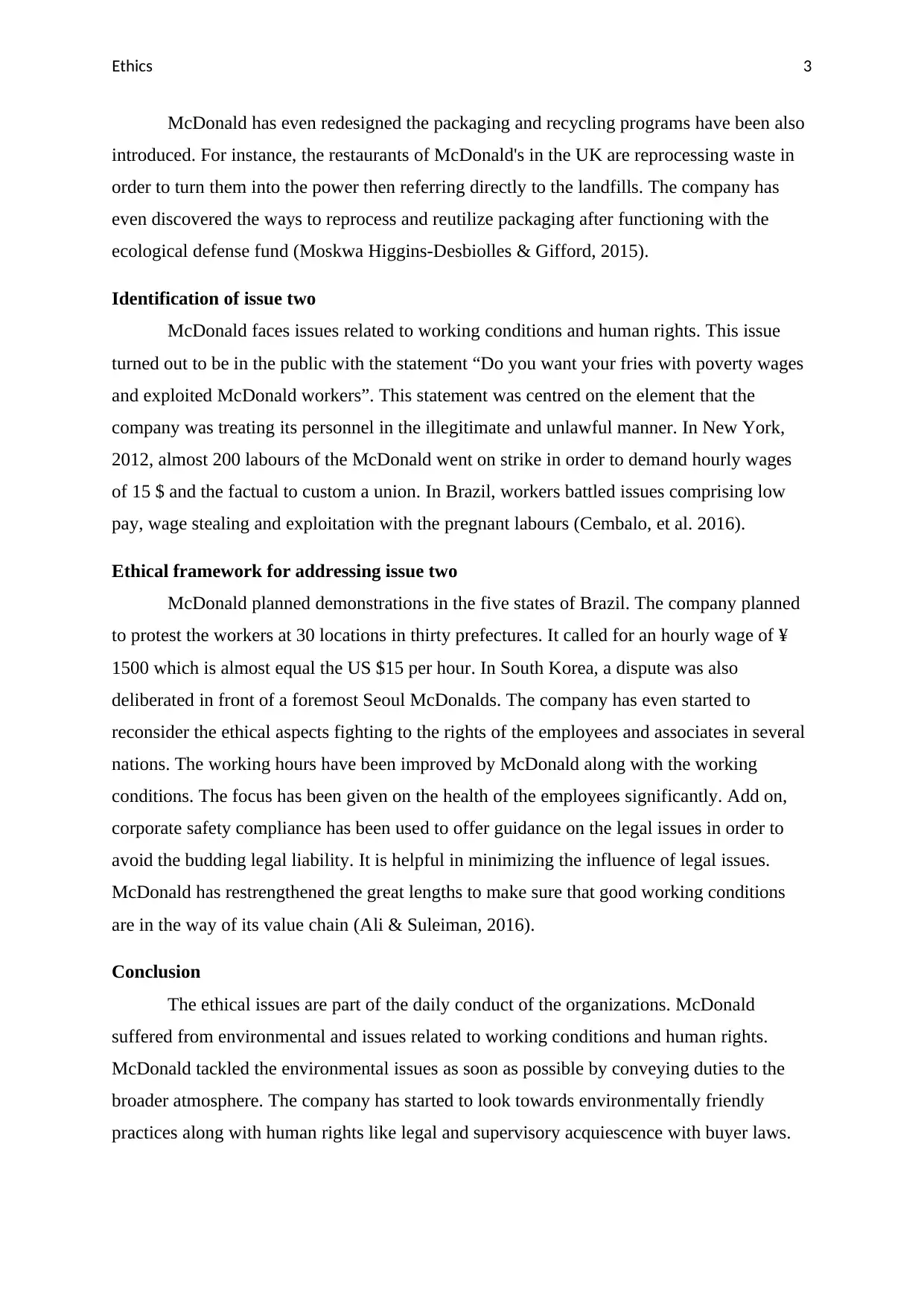
Ethics 3
McDonald has even redesigned the packaging and recycling programs have been also
introduced. For instance, the restaurants of McDonald's in the UK are reprocessing waste in
order to turn them into the power then referring directly to the landfills. The company has
even discovered the ways to reprocess and reutilize packaging after functioning with the
ecological defense fund (Moskwa Higgins-Desbiolles & Gifford, 2015).
Identification of issue two
McDonald faces issues related to working conditions and human rights. This issue
turned out to be in the public with the statement “Do you want your fries with poverty wages
and exploited McDonald workers”. This statement was centred on the element that the
company was treating its personnel in the illegitimate and unlawful manner. In New York,
2012, almost 200 labours of the McDonald went on strike in order to demand hourly wages
of 15 $ and the factual to custom a union. In Brazil, workers battled issues comprising low
pay, wage stealing and exploitation with the pregnant labours (Cembalo, et al. 2016).
Ethical framework for addressing issue two
McDonald planned demonstrations in the five states of Brazil. The company planned
to protest the workers at 30 locations in thirty prefectures. It called for an hourly wage of ¥
1500 which is almost equal the US $15 per hour. In South Korea, a dispute was also
deliberated in front of a foremost Seoul McDonalds. The company has even started to
reconsider the ethical aspects fighting to the rights of the employees and associates in several
nations. The working hours have been improved by McDonald along with the working
conditions. The focus has been given on the health of the employees significantly. Add on,
corporate safety compliance has been used to offer guidance on the legal issues in order to
avoid the budding legal liability. It is helpful in minimizing the influence of legal issues.
McDonald has restrengthened the great lengths to make sure that good working conditions
are in the way of its value chain (Ali & Suleiman, 2016).
Conclusion
The ethical issues are part of the daily conduct of the organizations. McDonald
suffered from environmental and issues related to working conditions and human rights.
McDonald tackled the environmental issues as soon as possible by conveying duties to the
broader atmosphere. The company has started to look towards environmentally friendly
practices along with human rights like legal and supervisory acquiescence with buyer laws.
McDonald has even redesigned the packaging and recycling programs have been also
introduced. For instance, the restaurants of McDonald's in the UK are reprocessing waste in
order to turn them into the power then referring directly to the landfills. The company has
even discovered the ways to reprocess and reutilize packaging after functioning with the
ecological defense fund (Moskwa Higgins-Desbiolles & Gifford, 2015).
Identification of issue two
McDonald faces issues related to working conditions and human rights. This issue
turned out to be in the public with the statement “Do you want your fries with poverty wages
and exploited McDonald workers”. This statement was centred on the element that the
company was treating its personnel in the illegitimate and unlawful manner. In New York,
2012, almost 200 labours of the McDonald went on strike in order to demand hourly wages
of 15 $ and the factual to custom a union. In Brazil, workers battled issues comprising low
pay, wage stealing and exploitation with the pregnant labours (Cembalo, et al. 2016).
Ethical framework for addressing issue two
McDonald planned demonstrations in the five states of Brazil. The company planned
to protest the workers at 30 locations in thirty prefectures. It called for an hourly wage of ¥
1500 which is almost equal the US $15 per hour. In South Korea, a dispute was also
deliberated in front of a foremost Seoul McDonalds. The company has even started to
reconsider the ethical aspects fighting to the rights of the employees and associates in several
nations. The working hours have been improved by McDonald along with the working
conditions. The focus has been given on the health of the employees significantly. Add on,
corporate safety compliance has been used to offer guidance on the legal issues in order to
avoid the budding legal liability. It is helpful in minimizing the influence of legal issues.
McDonald has restrengthened the great lengths to make sure that good working conditions
are in the way of its value chain (Ali & Suleiman, 2016).
Conclusion
The ethical issues are part of the daily conduct of the organizations. McDonald
suffered from environmental and issues related to working conditions and human rights.
McDonald tackled the environmental issues as soon as possible by conveying duties to the
broader atmosphere. The company has started to look towards environmentally friendly
practices along with human rights like legal and supervisory acquiescence with buyer laws.
Secure Best Marks with AI Grader
Need help grading? Try our AI Grader for instant feedback on your assignments.
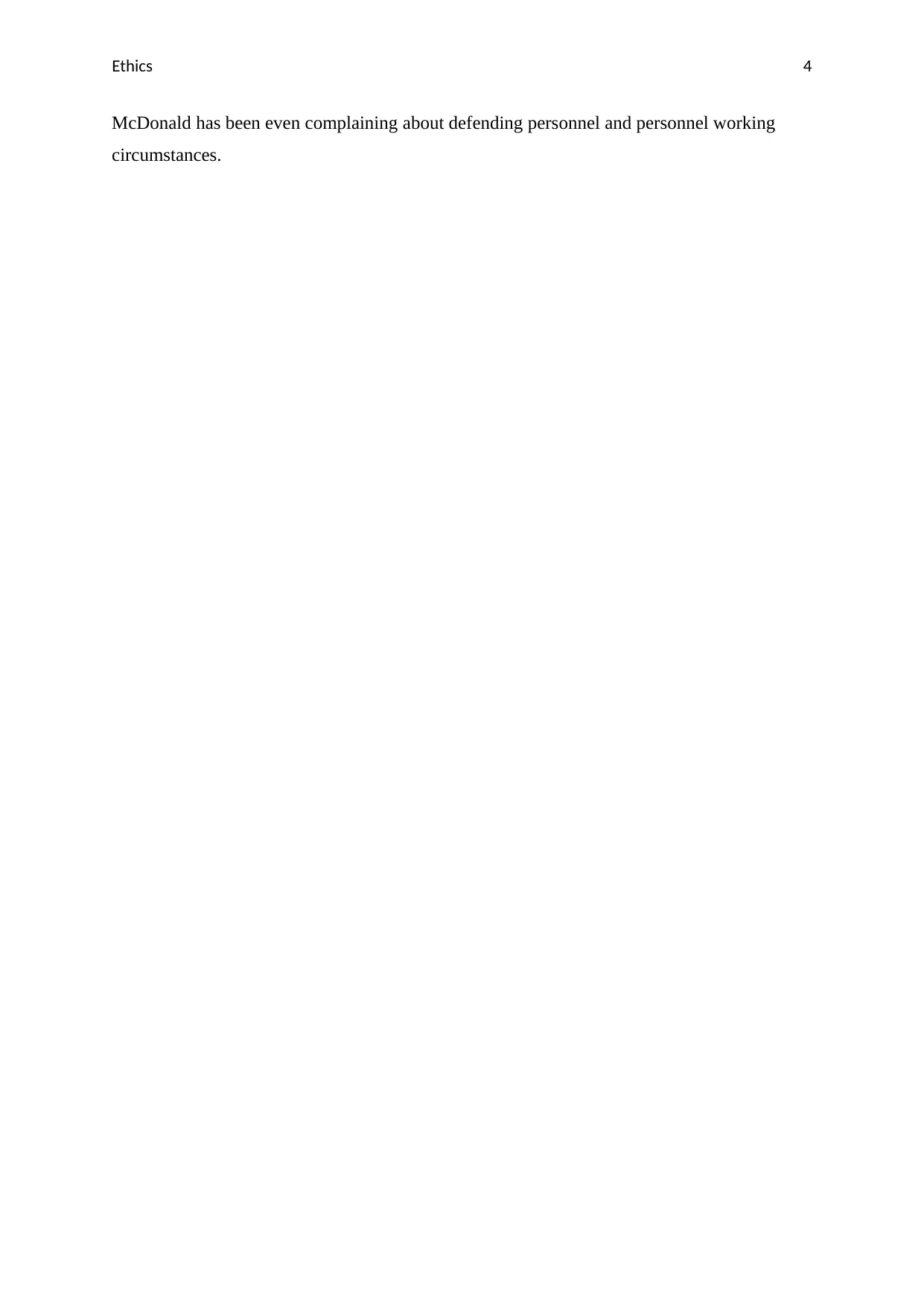
Ethics 4
McDonald has been even complaining about defending personnel and personnel working
circumstances.
McDonald has been even complaining about defending personnel and personnel working
circumstances.
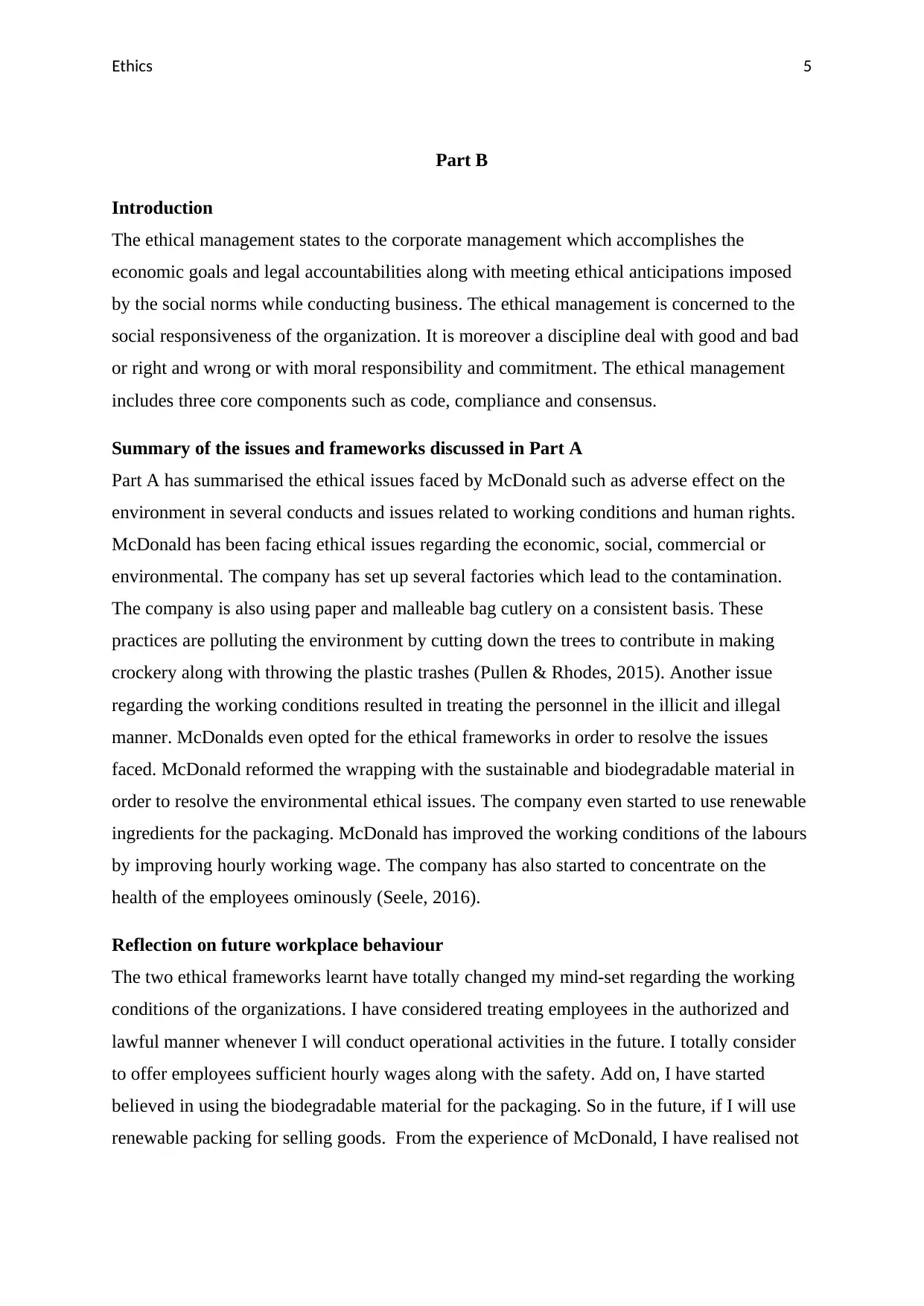
Ethics 5
Part B
Introduction
The ethical management states to the corporate management which accomplishes the
economic goals and legal accountabilities along with meeting ethical anticipations imposed
by the social norms while conducting business. The ethical management is concerned to the
social responsiveness of the organization. It is moreover a discipline deal with good and bad
or right and wrong or with moral responsibility and commitment. The ethical management
includes three core components such as code, compliance and consensus.
Summary of the issues and frameworks discussed in Part A
Part A has summarised the ethical issues faced by McDonald such as adverse effect on the
environment in several conducts and issues related to working conditions and human rights.
McDonald has been facing ethical issues regarding the economic, social, commercial or
environmental. The company has set up several factories which lead to the contamination.
The company is also using paper and malleable bag cutlery on a consistent basis. These
practices are polluting the environment by cutting down the trees to contribute in making
crockery along with throwing the plastic trashes (Pullen & Rhodes, 2015). Another issue
regarding the working conditions resulted in treating the personnel in the illicit and illegal
manner. McDonalds even opted for the ethical frameworks in order to resolve the issues
faced. McDonald reformed the wrapping with the sustainable and biodegradable material in
order to resolve the environmental ethical issues. The company even started to use renewable
ingredients for the packaging. McDonald has improved the working conditions of the labours
by improving hourly working wage. The company has also started to concentrate on the
health of the employees ominously (Seele, 2016).
Reflection on future workplace behaviour
The two ethical frameworks learnt have totally changed my mind-set regarding the working
conditions of the organizations. I have considered treating employees in the authorized and
lawful manner whenever I will conduct operational activities in the future. I totally consider
to offer employees sufficient hourly wages along with the safety. Add on, I have started
believed in using the biodegradable material for the packaging. So in the future, if I will use
renewable packing for selling goods. From the experience of McDonald, I have realised not
Part B
Introduction
The ethical management states to the corporate management which accomplishes the
economic goals and legal accountabilities along with meeting ethical anticipations imposed
by the social norms while conducting business. The ethical management is concerned to the
social responsiveness of the organization. It is moreover a discipline deal with good and bad
or right and wrong or with moral responsibility and commitment. The ethical management
includes three core components such as code, compliance and consensus.
Summary of the issues and frameworks discussed in Part A
Part A has summarised the ethical issues faced by McDonald such as adverse effect on the
environment in several conducts and issues related to working conditions and human rights.
McDonald has been facing ethical issues regarding the economic, social, commercial or
environmental. The company has set up several factories which lead to the contamination.
The company is also using paper and malleable bag cutlery on a consistent basis. These
practices are polluting the environment by cutting down the trees to contribute in making
crockery along with throwing the plastic trashes (Pullen & Rhodes, 2015). Another issue
regarding the working conditions resulted in treating the personnel in the illicit and illegal
manner. McDonalds even opted for the ethical frameworks in order to resolve the issues
faced. McDonald reformed the wrapping with the sustainable and biodegradable material in
order to resolve the environmental ethical issues. The company even started to use renewable
ingredients for the packaging. McDonald has improved the working conditions of the labours
by improving hourly working wage. The company has also started to concentrate on the
health of the employees ominously (Seele, 2016).
Reflection on future workplace behaviour
The two ethical frameworks learnt have totally changed my mind-set regarding the working
conditions of the organizations. I have considered treating employees in the authorized and
lawful manner whenever I will conduct operational activities in the future. I totally consider
to offer employees sufficient hourly wages along with the safety. Add on, I have started
believed in using the biodegradable material for the packaging. So in the future, if I will use
renewable packing for selling goods. From the experience of McDonald, I have realised not
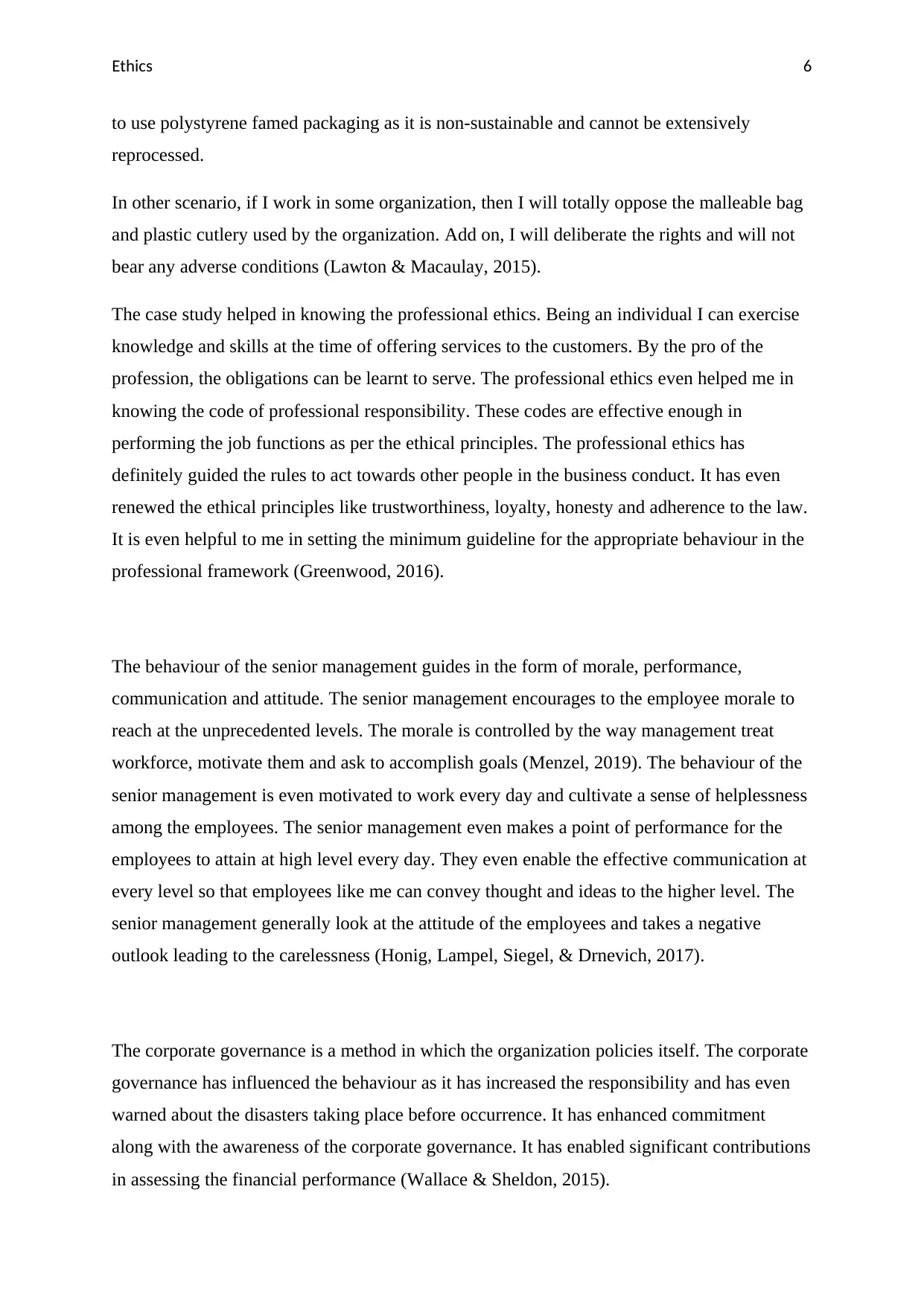
Ethics 6
to use polystyrene famed packaging as it is non-sustainable and cannot be extensively
reprocessed.
In other scenario, if I work in some organization, then I will totally oppose the malleable bag
and plastic cutlery used by the organization. Add on, I will deliberate the rights and will not
bear any adverse conditions (Lawton & Macaulay, 2015).
The case study helped in knowing the professional ethics. Being an individual I can exercise
knowledge and skills at the time of offering services to the customers. By the pro of the
profession, the obligations can be learnt to serve. The professional ethics even helped me in
knowing the code of professional responsibility. These codes are effective enough in
performing the job functions as per the ethical principles. The professional ethics has
definitely guided the rules to act towards other people in the business conduct. It has even
renewed the ethical principles like trustworthiness, loyalty, honesty and adherence to the law.
It is even helpful to me in setting the minimum guideline for the appropriate behaviour in the
professional framework (Greenwood, 2016).
The behaviour of the senior management guides in the form of morale, performance,
communication and attitude. The senior management encourages to the employee morale to
reach at the unprecedented levels. The morale is controlled by the way management treat
workforce, motivate them and ask to accomplish goals (Menzel, 2019). The behaviour of the
senior management is even motivated to work every day and cultivate a sense of helplessness
among the employees. The senior management even makes a point of performance for the
employees to attain at high level every day. They even enable the effective communication at
every level so that employees like me can convey thought and ideas to the higher level. The
senior management generally look at the attitude of the employees and takes a negative
outlook leading to the carelessness (Honig, Lampel, Siegel, & Drnevich, 2017).
The corporate governance is a method in which the organization policies itself. The corporate
governance has influenced the behaviour as it has increased the responsibility and has even
warned about the disasters taking place before occurrence. It has enhanced commitment
along with the awareness of the corporate governance. It has enabled significant contributions
in assessing the financial performance (Wallace & Sheldon, 2015).
to use polystyrene famed packaging as it is non-sustainable and cannot be extensively
reprocessed.
In other scenario, if I work in some organization, then I will totally oppose the malleable bag
and plastic cutlery used by the organization. Add on, I will deliberate the rights and will not
bear any adverse conditions (Lawton & Macaulay, 2015).
The case study helped in knowing the professional ethics. Being an individual I can exercise
knowledge and skills at the time of offering services to the customers. By the pro of the
profession, the obligations can be learnt to serve. The professional ethics even helped me in
knowing the code of professional responsibility. These codes are effective enough in
performing the job functions as per the ethical principles. The professional ethics has
definitely guided the rules to act towards other people in the business conduct. It has even
renewed the ethical principles like trustworthiness, loyalty, honesty and adherence to the law.
It is even helpful to me in setting the minimum guideline for the appropriate behaviour in the
professional framework (Greenwood, 2016).
The behaviour of the senior management guides in the form of morale, performance,
communication and attitude. The senior management encourages to the employee morale to
reach at the unprecedented levels. The morale is controlled by the way management treat
workforce, motivate them and ask to accomplish goals (Menzel, 2019). The behaviour of the
senior management is even motivated to work every day and cultivate a sense of helplessness
among the employees. The senior management even makes a point of performance for the
employees to attain at high level every day. They even enable the effective communication at
every level so that employees like me can convey thought and ideas to the higher level. The
senior management generally look at the attitude of the employees and takes a negative
outlook leading to the carelessness (Honig, Lampel, Siegel, & Drnevich, 2017).
The corporate governance is a method in which the organization policies itself. The corporate
governance has influenced the behaviour as it has increased the responsibility and has even
warned about the disasters taking place before occurrence. It has enhanced commitment
along with the awareness of the corporate governance. It has enabled significant contributions
in assessing the financial performance (Wallace & Sheldon, 2015).
Paraphrase This Document
Need a fresh take? Get an instant paraphrase of this document with our AI Paraphraser
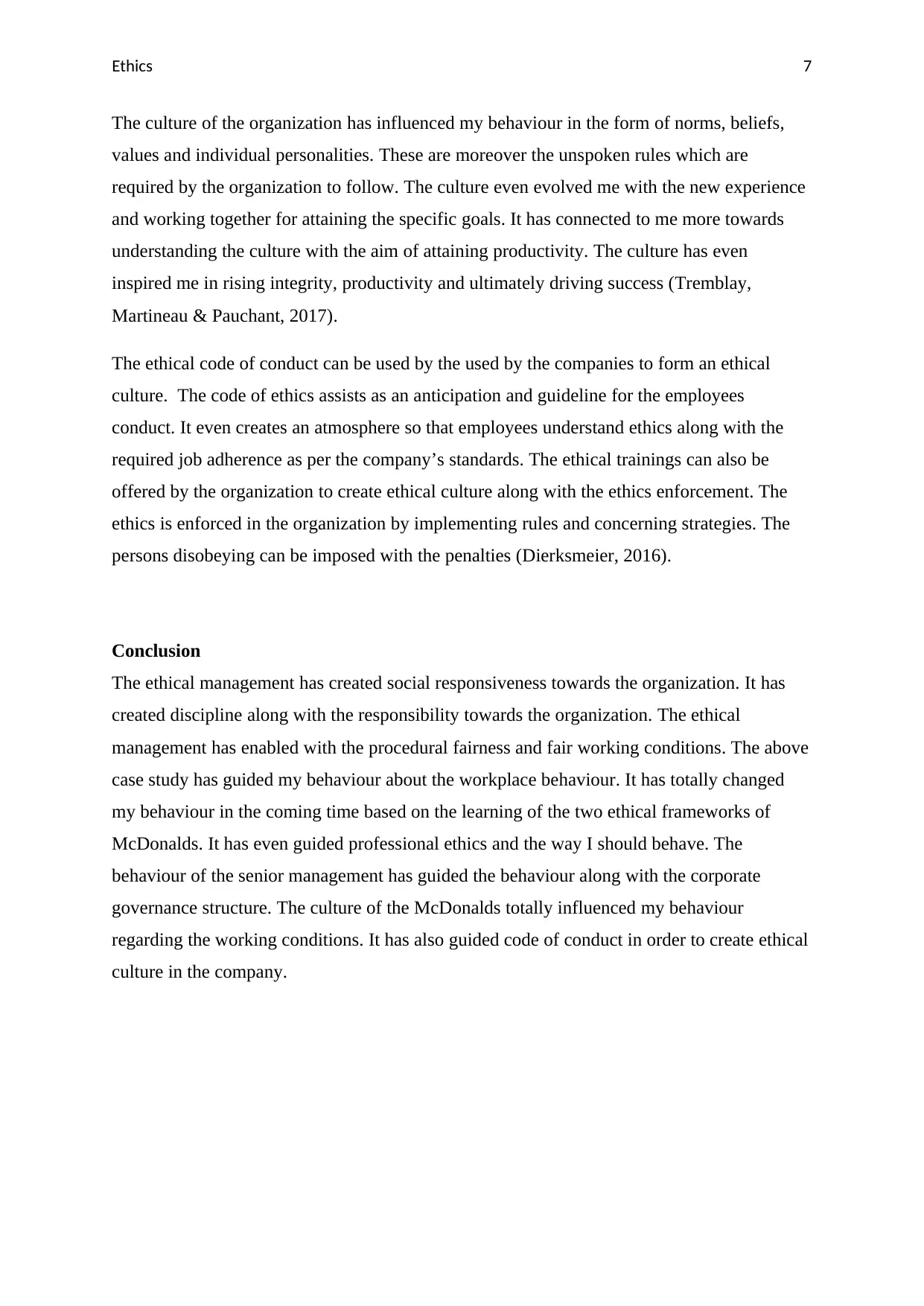
Ethics 7
The culture of the organization has influenced my behaviour in the form of norms, beliefs,
values and individual personalities. These are moreover the unspoken rules which are
required by the organization to follow. The culture even evolved me with the new experience
and working together for attaining the specific goals. It has connected to me more towards
understanding the culture with the aim of attaining productivity. The culture has even
inspired me in rising integrity, productivity and ultimately driving success (Tremblay,
Martineau & Pauchant, 2017).
The ethical code of conduct can be used by the used by the companies to form an ethical
culture. The code of ethics assists as an anticipation and guideline for the employees
conduct. It even creates an atmosphere so that employees understand ethics along with the
required job adherence as per the company’s standards. The ethical trainings can also be
offered by the organization to create ethical culture along with the ethics enforcement. The
ethics is enforced in the organization by implementing rules and concerning strategies. The
persons disobeying can be imposed with the penalties (Dierksmeier, 2016).
Conclusion
The ethical management has created social responsiveness towards the organization. It has
created discipline along with the responsibility towards the organization. The ethical
management has enabled with the procedural fairness and fair working conditions. The above
case study has guided my behaviour about the workplace behaviour. It has totally changed
my behaviour in the coming time based on the learning of the two ethical frameworks of
McDonalds. It has even guided professional ethics and the way I should behave. The
behaviour of the senior management has guided the behaviour along with the corporate
governance structure. The culture of the McDonalds totally influenced my behaviour
regarding the working conditions. It has also guided code of conduct in order to create ethical
culture in the company.
The culture of the organization has influenced my behaviour in the form of norms, beliefs,
values and individual personalities. These are moreover the unspoken rules which are
required by the organization to follow. The culture even evolved me with the new experience
and working together for attaining the specific goals. It has connected to me more towards
understanding the culture with the aim of attaining productivity. The culture has even
inspired me in rising integrity, productivity and ultimately driving success (Tremblay,
Martineau & Pauchant, 2017).
The ethical code of conduct can be used by the used by the companies to form an ethical
culture. The code of ethics assists as an anticipation and guideline for the employees
conduct. It even creates an atmosphere so that employees understand ethics along with the
required job adherence as per the company’s standards. The ethical trainings can also be
offered by the organization to create ethical culture along with the ethics enforcement. The
ethics is enforced in the organization by implementing rules and concerning strategies. The
persons disobeying can be imposed with the penalties (Dierksmeier, 2016).
Conclusion
The ethical management has created social responsiveness towards the organization. It has
created discipline along with the responsibility towards the organization. The ethical
management has enabled with the procedural fairness and fair working conditions. The above
case study has guided my behaviour about the workplace behaviour. It has totally changed
my behaviour in the coming time based on the learning of the two ethical frameworks of
McDonalds. It has even guided professional ethics and the way I should behave. The
behaviour of the senior management has guided the behaviour along with the corporate
governance structure. The culture of the McDonalds totally influenced my behaviour
regarding the working conditions. It has also guided code of conduct in order to create ethical
culture in the company.
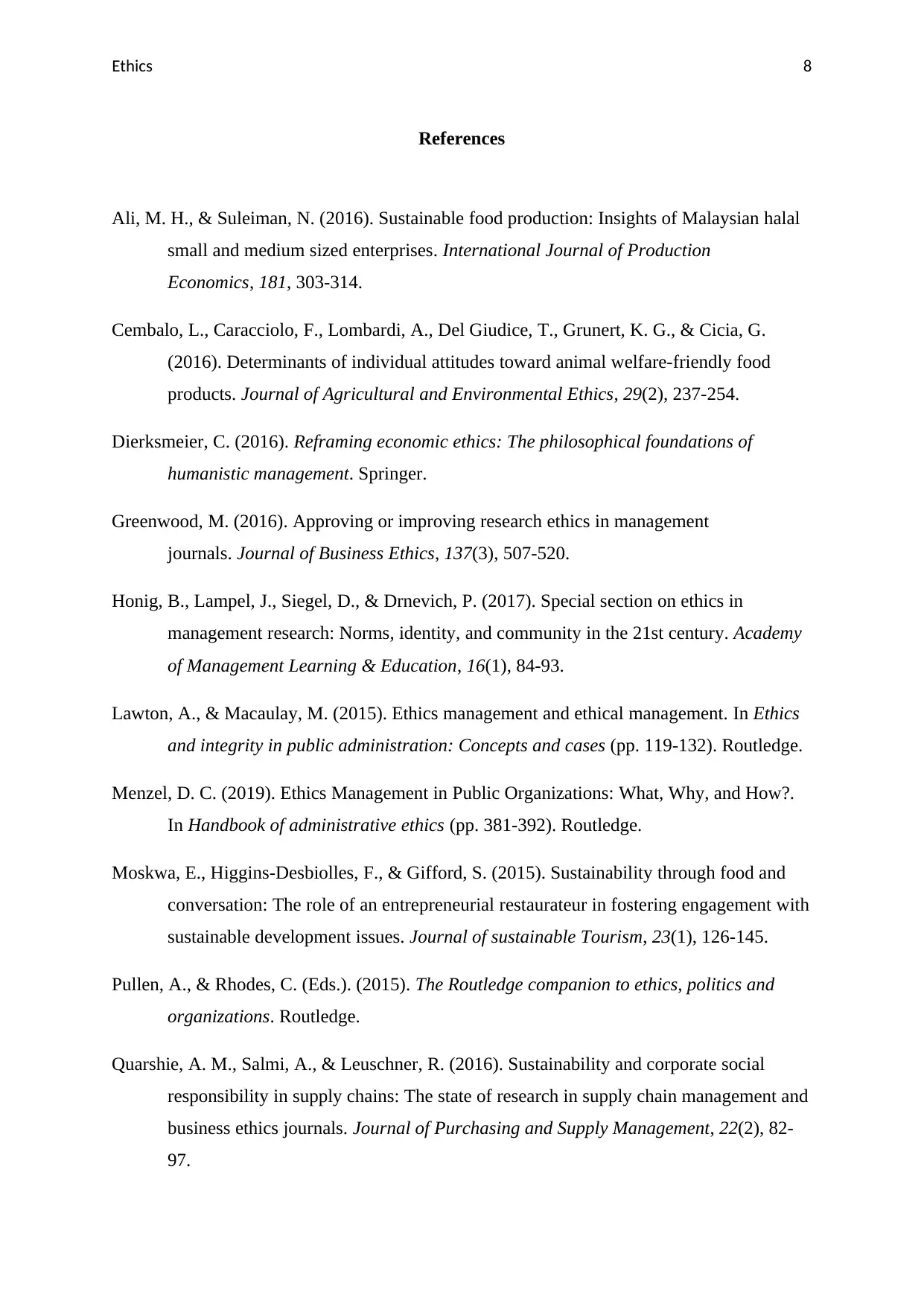
Ethics 8
References
Ali, M. H., & Suleiman, N. (2016). Sustainable food production: Insights of Malaysian halal
small and medium sized enterprises. International Journal of Production
Economics, 181, 303-314.
Cembalo, L., Caracciolo, F., Lombardi, A., Del Giudice, T., Grunert, K. G., & Cicia, G.
(2016). Determinants of individual attitudes toward animal welfare-friendly food
products. Journal of Agricultural and Environmental Ethics, 29(2), 237-254.
Dierksmeier, C. (2016). Reframing economic ethics: The philosophical foundations of
humanistic management. Springer.
Greenwood, M. (2016). Approving or improving research ethics in management
journals. Journal of Business Ethics, 137(3), 507-520.
Honig, B., Lampel, J., Siegel, D., & Drnevich, P. (2017). Special section on ethics in
management research: Norms, identity, and community in the 21st century. Academy
of Management Learning & Education, 16(1), 84-93.
Lawton, A., & Macaulay, M. (2015). Ethics management and ethical management. In Ethics
and integrity in public administration: Concepts and cases (pp. 119-132). Routledge.
Menzel, D. C. (2019). Ethics Management in Public Organizations: What, Why, and How?.
In Handbook of administrative ethics (pp. 381-392). Routledge.
Moskwa, E., Higgins-Desbiolles, F., & Gifford, S. (2015). Sustainability through food and
conversation: The role of an entrepreneurial restaurateur in fostering engagement with
sustainable development issues. Journal of sustainable Tourism, 23(1), 126-145.
Pullen, A., & Rhodes, C. (Eds.). (2015). The Routledge companion to ethics, politics and
organizations. Routledge.
Quarshie, A. M., Salmi, A., & Leuschner, R. (2016). Sustainability and corporate social
responsibility in supply chains: The state of research in supply chain management and
business ethics journals. Journal of Purchasing and Supply Management, 22(2), 82-
97.
References
Ali, M. H., & Suleiman, N. (2016). Sustainable food production: Insights of Malaysian halal
small and medium sized enterprises. International Journal of Production
Economics, 181, 303-314.
Cembalo, L., Caracciolo, F., Lombardi, A., Del Giudice, T., Grunert, K. G., & Cicia, G.
(2016). Determinants of individual attitudes toward animal welfare-friendly food
products. Journal of Agricultural and Environmental Ethics, 29(2), 237-254.
Dierksmeier, C. (2016). Reframing economic ethics: The philosophical foundations of
humanistic management. Springer.
Greenwood, M. (2016). Approving or improving research ethics in management
journals. Journal of Business Ethics, 137(3), 507-520.
Honig, B., Lampel, J., Siegel, D., & Drnevich, P. (2017). Special section on ethics in
management research: Norms, identity, and community in the 21st century. Academy
of Management Learning & Education, 16(1), 84-93.
Lawton, A., & Macaulay, M. (2015). Ethics management and ethical management. In Ethics
and integrity in public administration: Concepts and cases (pp. 119-132). Routledge.
Menzel, D. C. (2019). Ethics Management in Public Organizations: What, Why, and How?.
In Handbook of administrative ethics (pp. 381-392). Routledge.
Moskwa, E., Higgins-Desbiolles, F., & Gifford, S. (2015). Sustainability through food and
conversation: The role of an entrepreneurial restaurateur in fostering engagement with
sustainable development issues. Journal of sustainable Tourism, 23(1), 126-145.
Pullen, A., & Rhodes, C. (Eds.). (2015). The Routledge companion to ethics, politics and
organizations. Routledge.
Quarshie, A. M., Salmi, A., & Leuschner, R. (2016). Sustainability and corporate social
responsibility in supply chains: The state of research in supply chain management and
business ethics journals. Journal of Purchasing and Supply Management, 22(2), 82-
97.
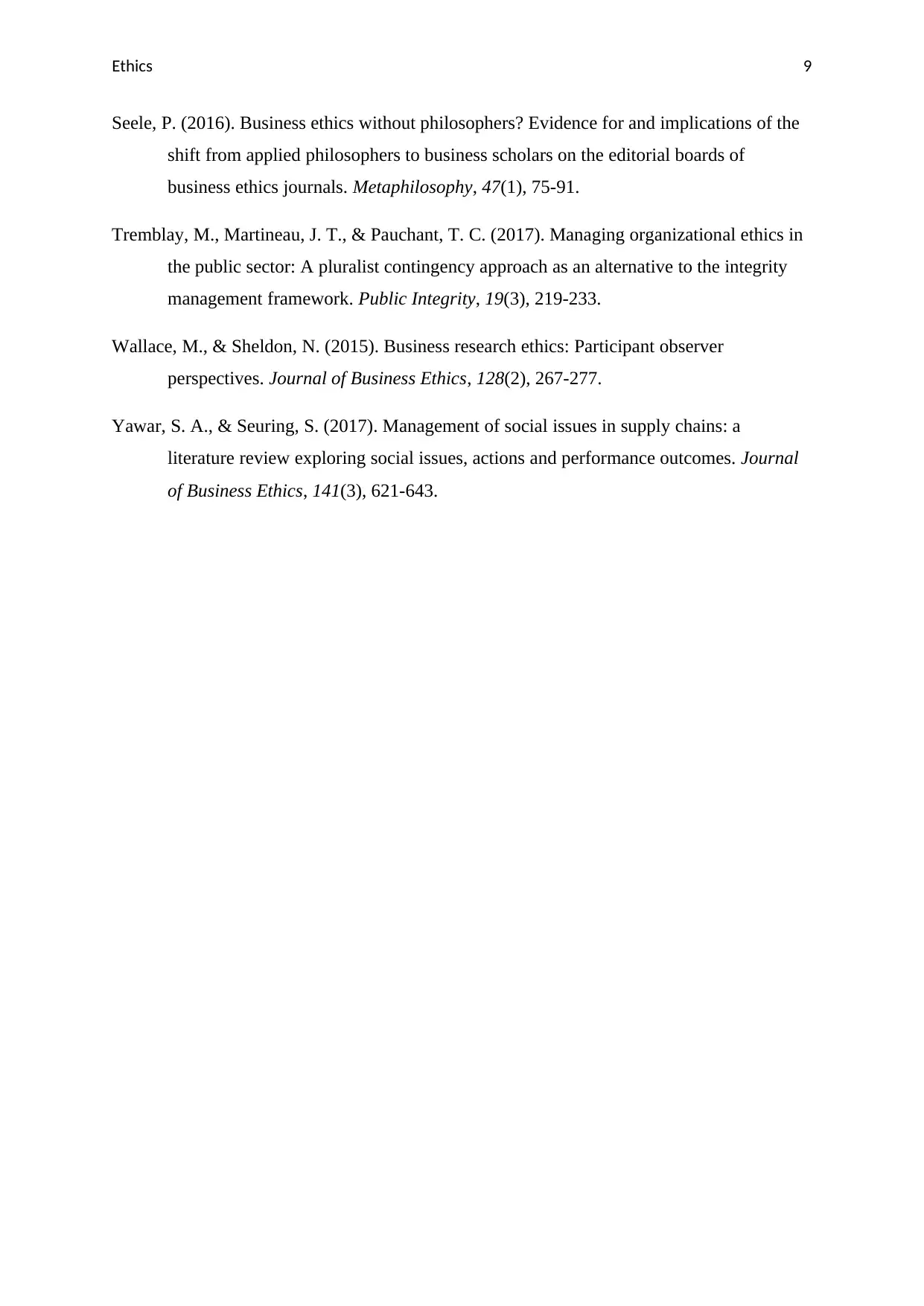
Ethics 9
Seele, P. (2016). Business ethics without philosophers? Evidence for and implications of the
shift from applied philosophers to business scholars on the editorial boards of
business ethics journals. Metaphilosophy, 47(1), 75-91.
Tremblay, M., Martineau, J. T., & Pauchant, T. C. (2017). Managing organizational ethics in
the public sector: A pluralist contingency approach as an alternative to the integrity
management framework. Public Integrity, 19(3), 219-233.
Wallace, M., & Sheldon, N. (2015). Business research ethics: Participant observer
perspectives. Journal of Business Ethics, 128(2), 267-277.
Yawar, S. A., & Seuring, S. (2017). Management of social issues in supply chains: a
literature review exploring social issues, actions and performance outcomes. Journal
of Business Ethics, 141(3), 621-643.
Seele, P. (2016). Business ethics without philosophers? Evidence for and implications of the
shift from applied philosophers to business scholars on the editorial boards of
business ethics journals. Metaphilosophy, 47(1), 75-91.
Tremblay, M., Martineau, J. T., & Pauchant, T. C. (2017). Managing organizational ethics in
the public sector: A pluralist contingency approach as an alternative to the integrity
management framework. Public Integrity, 19(3), 219-233.
Wallace, M., & Sheldon, N. (2015). Business research ethics: Participant observer
perspectives. Journal of Business Ethics, 128(2), 267-277.
Yawar, S. A., & Seuring, S. (2017). Management of social issues in supply chains: a
literature review exploring social issues, actions and performance outcomes. Journal
of Business Ethics, 141(3), 621-643.
1 out of 10
Your All-in-One AI-Powered Toolkit for Academic Success.
+13062052269
info@desklib.com
Available 24*7 on WhatsApp / Email
![[object Object]](/_next/static/media/star-bottom.7253800d.svg)
Unlock your academic potential
© 2024 | Zucol Services PVT LTD | All rights reserved.



